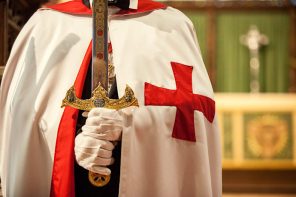One of the cornerstones of the new, and notorious, Texas social studies curriculum (see “Texas Textbook Massacre“), is the assertion that America was founded as a Christian nation. Meanwhile. Tea Party politicians leading up to today’s election have been tripping all over each other arguing the case of American Exceptionalism — the idea that God blessed this nation because of our Christian values.
In response, Ed Brayton at the blog Dispatches from the Culture Wars has decided to write a series of posts (Christian Nation: The Other Fundamentalist Perspective) about what some other Christians had to say about the Constitution. He’s analyzing the view by some conservative Christians (both historical and present-day) that the Constitution was written as a godless document — that the Founding Fathers don’t actually measure up to contemporary conservative standards. It’s a terrific project and I really wish I had thought of it first. Definitely worth reading in its entirety.
Ed’s first post includes a long passage from 1997’s The Godless Constitution by Cornell profs Isaac Kramnick and Laurence Moore, an historical refutation of the standard religious right argument that the founders intended a Christian nation. The book documents many of the things being said at the time by anti-federalists, pamphleteers and religious authorities. What were they saying? (Hint: They weren’t much impressed with the Founding Father’s refusal to include specific religious language into the Constitution.)
As Ed points out, many of the Calvinists opposed the lack of a religious test in the Constitution and took their opposition to the state ratifying conventions, where they urged state delegates not to sign on. As Ed quotes from the book:
If there was little debate in Philadelphia over the “no religious test” clause, a veritable firestorm broke out in the country at large during the ratification conventions in each of the states. Outraged Protestants attacked what they saw, correctly, as a godless Constitution. The “no religious test” clause was perceived by many to be the gravest defect of the Constitution. Colonel Jones, a Massachusetts delegate, told the state’s ratifying convention that American political leaders had to believe in God and Jesus Christ. Amos Singletary, another delegate to the Massachusetts ratification convention, was upset at the Constitution’s not requiring men in power to be religious “and though he hoped to see Christians [in office], yet by the Constitution, a papist, or an infidel was as eligible as they.” In New Hampshire the fear was of “a papist, a Mohomatan [sic], a deist, yea an atheist at the helm of government.”
Ed’s second post is about a new documentary from Adullam films called The Hidden Faith of the Founding Fathers. (The film company also produces movies that take an anti-evolution and pro-End Times perspective.) Needless to say, their historical accounting of the Founding Father’s faith should be taken with a grain of salt. But their alternative Christian take on the Constitution is an interesting one for those who follow attacks by the religious right on civil liberties.
From the web site:
1) The faith of Thomas Paine — the man who inspired the American Revolution, and the writing of the Declaration of Independence. This film shows how Paine’s influence over the Revolution was critical, while his anti-Christian writings revealed much of what the other founders truly believed.
2) The faith of Thomas Jefferson — author of the Declaration of Independence. Jefferson said the Book of Revelation was “the ravings of a maniac” and that the teachings of Jesus and the Apostles were full of “imposture” and “stupidity.” After his private papers were published, he was called “the reviler of Christ” by a leading clergyman.
3) The faith of Benjamin Franklin — the only man to sign all of the original founding documents. Franklin was part of a radical occult group known as “The Hellfire Club” in England that took part in satanic rituals, which may have included human sacrifice. Shortly before he died, he openly stated that he did not believe the Gospel.
As Ed points out, the documentary should probably not be taken as necessarily historically accurate, but its message is one that merits some consideration, especially by their fellow brethren:
Now, some of this is likely exaggerated, especially the nonsense about freemasonry. But it is certainly true that the same people who pretend that Jefferson, Adams, Washington and Franklin were good Christian men would emphatically reject their views if told of them specifically.
All of those men believed strongly in a personal, provident God, but they also all rejected much of the Christian mythology. They were each unitarian and universalist in their views, rejecting much of what the Bible claims about Jesus. Were any of them to walk into the office of David Barton and declare their views, he would consider them heretics.




